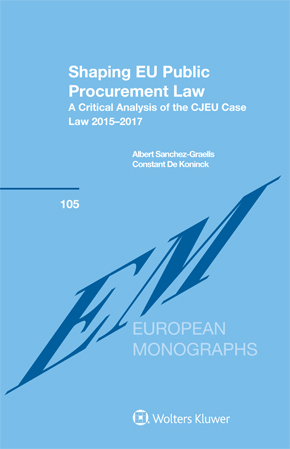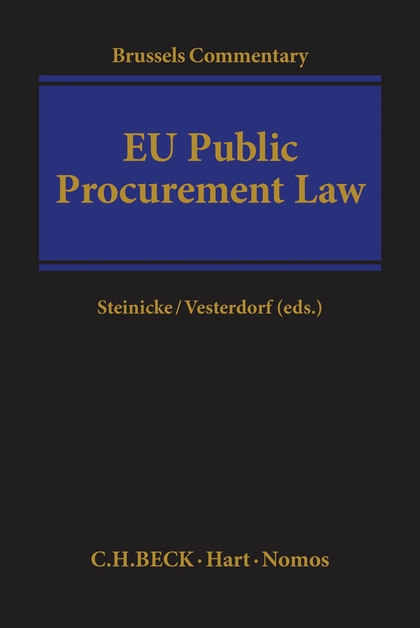Shaping EU Public Procurement Law: A Critical Analysis of the CJEU Case Law 2015–2017
What’s in this book: The first part of the book offers a unique reflection on enduring themes in public procurement law such as the following and concludes with some thoughts on some of the salient aspects of this recent episode of silent reform of EU public procurement law through CJEU case law: shaping of the scope of this regulatory regime; development of tighter criteria for the exclusion of candidates and tenderers; conduct of qualitative selection; consolidation of the court’s previous approach to technical specifications; new developments in tender evaluation; inclusion of contract performance clauses with a social orientation; and development of interpretive guidance concerning several aspects of the procurement…
Brussels Commentary on EU Public Procurement Law (contributions by Caranta and Sanchez-Graells)
The Brussels Commentary on EU Public Procurement Law, edited by Michael Steinicke and Peter L. Vesterdorf (Nomos/Hart, Oxford, 2018) features contributions by EPLG Members Roberto Caranta and Albert Sanchez-Graells. The book is available here.
Transatlantic Defence Procurement. EU and US Defence Procurement in the Transatlantic Defence Market
Transatlantic Defence Procurement. EU and US Defence Procurement in the Transatlantic Defence Market (Cambridge: Cambridge University Press, 2017). 268 pages. ISBN: 9781107115514. GBP 95. By Luke R.A. Butler This volume constitutes the first ever attempt to establish a basis for comparative research on defence procurement regulation. For decades there has been repeated emphasis on the extent to which barriers to trade in Europe and the US prevent a more competitive defence market. Transatlantic Defence Procurement offers a first analysis of the potential impact of defence procurement regulation itself as a barrier to trade between the US and EU. Part I examines the external dimension of a new EU Defence Procurement Directive,…
Smart Public Procurement and Labour Standards
Smart Public Procurement and Labour Standards. Pushing the Discussion after RegioPost (Bloomsbury, 2018). Edited by Albert Sánchez Graells, with contributions by Piotr Bogdanowicz and Roberto Caranta Smart procurement aims to leverage public buying power in pursuit of social, environmental and innovation goals. Socially-orientated smart procurement has been a controversial issue under EU law. The extent to which the Court of Justice (ECJ) has supported or rather constrained its development has been intensely debated by academics and practitioners alike. After the slow development of a seemingly permissive approach, the ECJ case law reached an apparent turning point a decade ago in the often criticised judgments in Rüffert and Laval, which left a number of open questions.…
Characteristics of Separate Operational Units – A Study on Aggregation Rules under Public Procurement Law
The principle of effectiveness is one of the fundamental principles in EU law. Even though the principle ensures the effectiveness of all EU legislation, it also has a key role in the interpretation of EU procurement rules. The Cour of Justice of the European Union has often address the principle of effectiveness in its case law and has consistently held that, in the absence of EU rules governing the matter, it is for every member state to lay down the detailed rules of administrative and judicial procedures for safeguarding rights, which individuals derive from EU law.
The Application of the Principle of Proportionality to Modifications of Public Contracts
The rules regarding modifications of public contracts were added to EU public procurement law in 2014 in order to clarify the conditions set forth by the relevant case law of the Court of Justice of the European Union. However, the provisions that were ultimately adopted are not quite black and white as one might think. One of the grey areas might be the application of the principle of proportionality to modifications of public contracts. New directives mention proportionality as a principle of “procurement”. This article presents a view that contracting authorities shall act in a proportionate manner also after the “procurement” decision has been made, i.e. when a contract…
Reformation or Deformation of the EU Public Procurement Rules
Using an innovative ‘law and political science’ methodology, this timely book carries out a critical assessment of the reform of the EU public procurement rules. It provides a rich account of the policy directions and the spaces for national regulatory decisions in the transposition of the 2014 Public Procurement Package, as well as areas of uncertainty and indications on how to interpret the rules in order to make them operational in practice. Edited by Grith Skovgaard Ølykke, Albert Sanchez-Graells http://www.e-elgar.com/shop/reformation-or-deformation-of-the-eu-public-procurement-rules
Integrity and Efficiency in Sustainable Public Contracts.
Balancing Corruption Concerns in Public Procurement Internationally “Ensuring efficiency and integrity throughout the public procurement cycle is essential to a sound allocation of taxpayers’ money. Yet public contracts are plagued by corruption, collusion, favoritism and conflicts of interest. This book addresses these problems from sophisticated, academic, institutional and practical perspectives. The book’s ambition is to shape the public debate in the procurement community by highlighting how corruption implies violations of fundamental rights and undermines the fiduciary relationship between citizens and public institutions. The analysis underlines how corruption may stem from – and yet be resolved – through the exercise of discretion in the public procurement system. Focusing on the…
Disclosure Rules In EU Public Procurement – Balancing Between Competition and Transparency
K-M.Halonen, Disclosure Rules In EU Public Procurement – Balancing Between Competition and Transparency, peer-reviewed, the Journal of Public Procurement, Vol. 16, Number 4, Winter 2016, pp. 528–553.
Is the remedy of contractual ineffectiveness truly effective in Finland?
The principle of effectiveness is one of the fundamental principles in EU law. Even though the principle ensures the effectiveness of all EU legislation, it also has a key role in the interpretation of EU procurement rules. The Cour of Justice of the European Union has often address the principle of effectiveness in its case law and has consistently held that, in the absence of EU rules governing the matter, it is for every member state to lay down the detailed rules of administrative and judicial procedures for safeguarding rights, which individuals derive from EU law.
Privacy Overview
This website uses cookies to improve your experience while you navigate through the website. Out of these, the cookies that are categorized as necessary are stored on your browser as they are essential for the working of basic functionalities of the website. We also use third-party cookies that help us analyze and understand how you use this website. These cookies will be stored in your browser only with your consent. You also have the option to opt-out of these cookies. But opting out of some of these cookies may affect your browsing experience.
Necessary cookies are absolutely essential for the website to function properly. These cookies ensure basic functionalities and security features of the website, anonymously.
| Cookie | Duration | Description |
|---|---|---|
| cookielawinfo-checkbox-advertisement | 1 year | Set by the GDPR Cookie Consent plugin, this cookie is used to record the user consent for the cookies in the "Advertisement" category . |
| cookielawinfo-checkbox-analytics | 11 months | This cookie is set by GDPR Cookie Consent plugin. The cookie is used to store the user consent for the cookies in the category "Analytics". |
| cookielawinfo-checkbox-functional | 11 months | The cookie is set by GDPR cookie consent to record the user consent for the cookies in the category "Functional". |
| cookielawinfo-checkbox-necessary | 11 months | This cookie is set by GDPR Cookie Consent plugin. The cookies is used to store the user consent for the cookies in the category "Necessary". |
| cookielawinfo-checkbox-others | 11 months | This cookie is set by GDPR Cookie Consent plugin. The cookie is used to store the user consent for the cookies in the category "Other. |
| cookielawinfo-checkbox-performance | 11 months | This cookie is set by GDPR Cookie Consent plugin. The cookie is used to store the user consent for the cookies in the category "Performance". |
| viewed_cookie_policy | 11 months | The cookie is set by the GDPR Cookie Consent plugin and is used to store whether or not user has consented to the use of cookies. It does not store any personal data. |
Functional cookies help to perform certain functionalities like sharing the content of the website on social media platforms, collect feedbacks, and other third-party features.
| Cookie | Duration | Description |
|---|---|---|
| __cf_bm | 30 minutes | This cookie, set by Cloudflare, is used to support Cloudflare Bot Management. |
Performance cookies are used to understand and analyze the key performance indexes of the website which helps in delivering a better user experience for the visitors.
Analytical cookies are used to understand how visitors interact with the website. These cookies help provide information on metrics the number of visitors, bounce rate, traffic source, etc.
Advertisement cookies are used to provide visitors with relevant ads and marketing campaigns. These cookies track visitors across websites and collect information to provide customized ads.
Other uncategorized cookies are those that are being analyzed and have not been classified into a category as yet.










